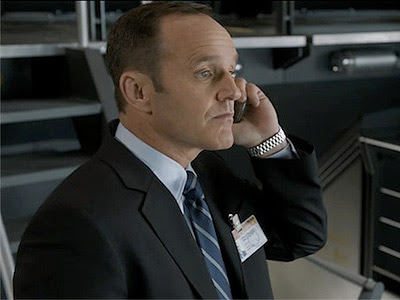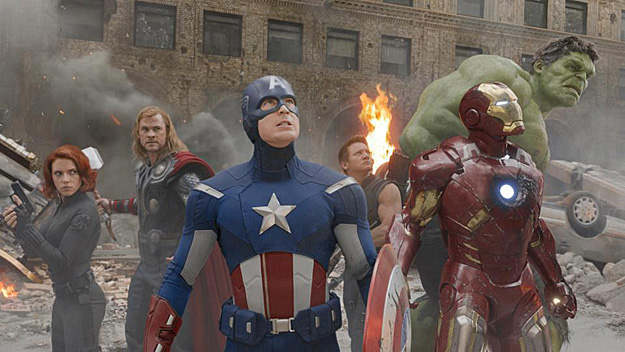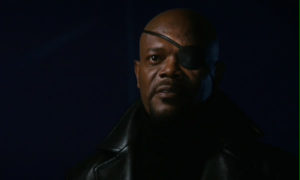‘The Avengers’ Shows How To Believe In Heroes, Part 1
Avengers: Age of Ultron debuts in the U.S. Friday, May 1—two weeks away. Has it already been three years since the world’s first big-budget superhero team-up film first released?
Yes, The Avengers came out Friday, May 4 in the United States. I can still recall that sense of geeky thrill—yes, even for a chap like me who had little exposure to Marvel comics and heroes. I was one of those un-cools who joined the Merry Marvel Marching Society (film and television adaptation version) only after Spider-Man released in 2002.
Last Saturday I saw The Avengers for yet another time, as part of my wife’s and my Marvel Cinematic Universe (MCU) marathon. It’s sent me pondering why I like this film and other superhero films so much.
Like many true comics fans, I can say Spider-Man appealed to me because of his awkwardness and a little wish fulfillment. But I can’t join true fans and say that it’s been my life’s dream since the 1970s, when I was alone in my room with (Whatever) Issue #28, to see The Avengers and S.H.I.E.L.D. and such realized on the big screen.
But I can say this: In that dark theater, captivated by The Avengers—along with a crowd of friends and fellow explorers from my church—I believed a superhero story could fly.
And that a man could fly, inside a high-tech robo-suit.
And that a man could lose control and turn into a giant green rage monster.
And that another man could fly and shoot lighting with his magic hammer.
And that a man could be a truly good super-soldier without being “boring” like all those cool geeks on the fan forums are all supposed to call Superman.
And even that another man could shoot high-tech trick arrows with ridiculous accuracy, and that a woman could only look like the “shooting-up heroine” sexy action-movie cliché but offer surprising yet natural depth in her own story and her respect for her colleagues.
The Avengers and their epic heroics gave me joy. And for that I thank God.
‘You’ve become part of a bigger universe; you just don’t know it yet’
Remember back when people critiqued the third MCU film, Iron Man 2, for all manner of flaws? Some of those criticisms were accurate. But others said the film was just too busy with setting up some future film called The Avengers.
That criticism falls apart and Iron Man 2 improves. First, fans can see in retrospect why the story needed to introduce S.H.I.E.L.D. and company. Second, now we know better what the MCU storytellers were trying to do: set up a real, live, functioning onscreen universe in which one story turn or plot point or cameo in Film 3 directly affects Film 6.
The Avengers as a film is inseparable from both its preceding films and its own origin story.
In the story-world, mankind is confronted with fantastical realities such as superpowers and alien beings. But in the real world, popular culture was confronted with this new idea: Hey, instead of having separate superhero movies in which each hero has his own story and arcs and villains, why not have a “shared cinematic universe,” very similar to the original comics, in which each set of heroes, villains, and stories interacts with all the others?
Many people dismiss or think they should dismiss big-budget popular culture franchises as jejune, uncreative affairs. But let’s not forget how risky and groundbreaking this “shared cinematic universe” idea was at the time. Marvel was choosing to stop following the usual superhero movie formula and instead play by long-form storytelling rules, similar to a TV action-drama series on super-serum, in which each “episode” lasts 2 hours (instead of 45 minutes with commercial breaks) and releases every 6 months (instead of weekly) and costs seven figures each. That just wasn’t done. No one had done it before.
Now every kid wants a shared film universe. But The Avengers franchise was the pioneer.
Protagonists and plot
The previous unbroken superhero movie rule was: “All the story-world revolves around one hero.” But seeing the film for the fifth/sixth time, I was again surprised with how deftly the story manages a true ensemble of heroes—chiefly Tony Stark, Bruce Banner, Steve Rogers, and Thor as well as S.H.I.E.L.D. agents Black Widow and Hawkeye, but also Nick Fury, Dr. Eric Selvig, Agent Phil Coulson, and newcomer Agent Maria Hill.
Each is memorable and has his/her own crucial part to play. No one (not even Agent Hill) is there solely because a memo required it. Each part functions in the story body.
You might be able to pick a favorite character. I can’t. I really can’t. It seems the story can’t either. Did the writer establish word or screen time counts for each character so that no one held the spotlight for too long? No, because the approach is far more organic than that.
Franchise-starter Tony “Iron Man” Stark? We find him kickstarting his revolutionary New York City tower, and later he confronts Loki solo. But this isn’t a sneaked-in Iron Man 3.
Bruce “The Hulk” Banner? He hasn’t even had more than one solo film (and has a new lead actor). But he’s just as prevalent here as the heroes who have full planned film trilogies.
Steve “Captain America” Rogers? You could make a whole film about his Rip-van-Winkling into the present age. (Later they did.) Yet Cap’s personal story adds perfectly to this story.
Thor? It’s his brother Loki, his accidental “first contact,” and his culture’s technology that drives the whole plot. But Thor himself arrives late in our story, already in progress.
Some fans complain that Agent Cliff “Hawkeye” Barton spent most of the story hypnotized. It wasn’t until my recent viewing that it hit me: This also shows you more about who he is, because we don’t yet see what Agent Natasha “Black Widow” Romanoff describes: Barton’s character and virtue, enough to make a different call when he was set to kill her. And Black Widow, who debuted even before Thor and Cap, springs out her limited action-heroine role in Iron Man 2, sharing the spotlight with all the rest.

Even the non-top-billed heroes get their moments—especially early franchise-jumper Agent Coulson, whose inevitably-temporary death helps galvanize the superhero team.
Oddly enough, given all these large personalities, the film rightly keep the plot itself to an almost-juvenile minimum. “Evil aliens invade to get special magic MacGuffin” summarizes it all. And the story (unlike the future competing franchise-starter Man of Steel) does not even belabor the rather world-shaking point that this is real-life aliens invading major cities.
Half the MCU films have followed this: Ancient backstory, magic MacGuffin, villains want it, end of world!, wait! heroes, world saved, end credits, post-credits scene.
Again, we could dismiss this as low culture. But it works. And it works because most fans are o’t repeatedly urging Marvel with each new film (and TV announcement) “shut up and take my money” because the plots are all that original.
We’re not even that enthralled with the special effects or creative world-building.
No, it’s the heroes we want to follow. Heroes who are loud and colorful and different. Heroes who are more than just the quasi-medieval prophesied monomyth archetype re-re-re-re-re-re-cloned. Instead, in all the MCU and particularly in The Avengers, all the heroes in this shared cinematic universe are the most special effect. And we want to believe in them.
Next time: Exploring the conflicts, top scenes, and world-building of The Avengers.
Meanwhile, explore more Marvel Cinematic Universe fandom on SpecFaith, such as Thunders of ‘Thor’ Echo Biblical Truth and ‘Captain America: The Winter Soldier’ Fights for True Freedom and Salvation of Enemies.
































Love this!…because I love the Avengers. 😀 Fictional heroes are amazing because they remind me of the real Hero who died for me. I grew up in the church, but it took a strangely long time for it to dawn on me that Jesus is an actual REAL hero – emphasis on the “real” part, because I always knew He was a hero. But unlike speculative fiction heroes, He is true and touchable and worthy of all worship, an actual human being we are supposed to adore and admire with all our hearts. It’s very hard to describe what I mean here…but that revelation was mind-boggling to me.
Can we PLEASE have discussion of how the MCU TV shows fit into it? I know the DC has Flash and Arrow and Gotham (not even all on the same network) but Agents of Shield has gone from reacting to Winter Soldier to setting up plot elements for Inhumans (five or so years down the road).
Agent Carter (I’m specifically thinking about Dottie and related elements) provided background for events that are still in play in the modern day MCU, instead of just playing filler.
Ah, for the MCU television stories, I explored “Agents of S.H.I.E.L.D.” season 1 at Christ and Pop Culture last year (and will likely write more after season 2 is finished). And my wife Lacy Burnett was last seen simulposting her overview Exploring the Themes and Threads of Agent Carter here at SpecFaith.
And the idea of following characters, rather than plot, is what really enthralls me about Agents of Shield. I saw a quote:
Coulson has the same ideals, the same dedication, as Steve Rogers; he just doesn’t have the same abilities. And how Coulson reacts to the fall of Shield, how he responds when everything he’s dedicated himself to is believed to be rotten and hollow–it’s utterly fascinating. You don’t need a hero at war with himself to make him interesting. A good man can find all the conflict necessary for a story by just living, by trying to hold to the truth in a world of lies and deceptions.
And (vague spoilers for post 2×10 here), the heroic journey of another character gains a whole new perspective because it isn’t expected, it’s not like the films where one knows Stark is going to be Iron Man, that Rogers is going to be Captain America. It’s a journey that the character resists and the audience doesn’t really know how it’s going to end….
Love this, because I love everything related to Marvel!
I think the MCU was a brilliant move on Marvel’s part. That’s what captures my imagination most about the Marvel movies and TV shows, and every time I think of how they all connect and are part of a larger picture, it blows my mind. I love how the plotlines interweave and that something in one movie has implications for later movies. The way SHIELD tied into Captain America: Winter Soldier and how even way back in Avengers the tension between Cap and Iron Man foreshadows the plot of Captain America: Civil War.
On top of all that, what’s better than having so many dynamic characters interact? That’s where the Avenger movies shine.
Marvel took a chance doing something unheard of, and now it’s paying off.
Anxiously awaiting May 1.